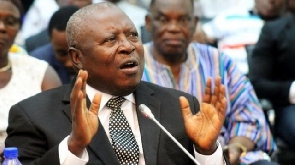The Feminization of Poverty: Examining Ghana’s Moral Conundrum. How Do We Plane the Gender Field?
The inability of the state to protect the innocence of our nation’s female population poses a grave threat to efforts to contain the adverse effects of poverty on national development. It is not an imaginary conjuration to surmise that, in the coming decades, the nation’s female population will lose the little empowerment they have gained of the years, and become chattels in a patriarchal state where men hardly appreciate the self-worth of women, and treat us as disposal physical acquisitions. In my opinion, the Ministry of Women’s and Children Affairs is not only a wasteful institution among the nation’s many dysfunctional establishments, its depressing record in introducing, and implementing policies to eliminate the mistreatment of women is a sad chapter in our nation’s contemporary democratic development.What happened to the four-year girl who was raped by her grandfather, and was infected with the HIV/AIDS virus? Can the designated Minister responsible for the protection of the nation’s children update us about the status of the victim’s health? Or, has the young girl’s adversity become part of Ghana’s rising statistics on pedophilia and incest, and the belief that, the less it is talked about it, the problem will ultimately go way? Our nation’s socio-cultural and moral order, and the silence of the state on primeval practices, such as the rape of underage girls, “trokosi” and “asiwa,” could hamper the nation’s collective determination to address the historical inequalities that have downgraded Ghanaian women to a lesser station.
Would any of our leaders, and/or cultural preservationists, who rationalize “trokosi” as a practice within Judaism, which it isn’t, allow their loved ones to become victims of such an oppressed system? While the response to the preceding is a resounding no, some strange bedfellows continue to support the upholding of this human barbarity on society’s vulnerable with the excuse that, it is part of our culture. Isn’t history interesting, especially when it is told from the tainted prisms of cyber-preachers who have little knowledge of the changing human culture?
Unabashed by the misery of these young girls, some of the nation’s male policymakers, and their educated female allies have joined hands to enact unfriendly policies that suppress the aspirations of the Ghanaian woman to self-autonomy. Has anyone ever questioned why the “rape” clause was taken out of the nation’s Anti-Domestic Violence Law, which was recently passed by the House? Why is the 21st century Ghanaian male horrified by the aspiration of the Ghanaian woman to break free from male-dominance?
By allowing the lust of our nation’s male population to constantly violate the sanctity of Ghanaian women without any remedy, our nation is courting an immoral behaviour that could eventually transfer the consequences of an individual’s moral indiscretions unto the resource-strapped public. One could estimate the impending cost of the foregoing assertion in the form of transmittable diseases, adolescent prostitution, teenage pregnancy, fatherless children, an uneducated population, and armed robbery.
In today’s Ghana, it takes a bottle of Guinness at the roadside bar, or a cone of ice cream at Mr. Big Restaurant to extort sex from underage girls. The question many usually asked is, whether the perpetrators of this depraved conduct are society’s refuseniks. No, they are not. On the contrary, there seem to be a "coalition of the willing" between Ghanaians at home, and those abroad, who experiment their perverted sexual fantasies on their unwary female victims. In some cited instances, certain members of the nation’s political elite themselves consumers of the adolescent sex trade. Not only do they offer material favours for sex, they also engaging in non-traditional sex as away of fulfilling their pornographic stardom in a society where the rich can commit the most heinous crime without punishment.
We should challenge the "animalisms" in our nation’s culture, and call for tougher sentences for perpetrators of these practices. The inaction on the part of the government, and the state’s exploitation of a lingering problem as a way of getting its ministers to attend international conferences must also be interrogated. We are all witnessed the shame Dr. Anane’s visit to an HIV/AIDS Conference brought to us, not counting the transfer of US$ 90,000 to his mistress as child-support payment.
Instead of believing in the benevolence of the state, and seeing it as committed to addressing the increasing powerlessness of Ghana’s female population, grassroots female leaders, with their male-feminists must lead the campaign to change the worldview of our nation’s misogynists whose thinking of the contemporary woman is sourced from “obagyimi emre.” Driven by legitimate grievances, and our disaffection with the status quo, women could create a politic bloc within mainstream national politics, and use their numerical majority to elect a woman-president who understands, and share the afflictive experiences of the Ghanaian woman.
As part of this noble idea, the Ghanaian Women’s movement could use information technology to sway public, and international opinion on the cause of the movement. In an alternative context, the movement could use the international media to court foreign allies to pressure their home government to deny the Ghanaian government aid meant for programs for Ghanaian women.



















